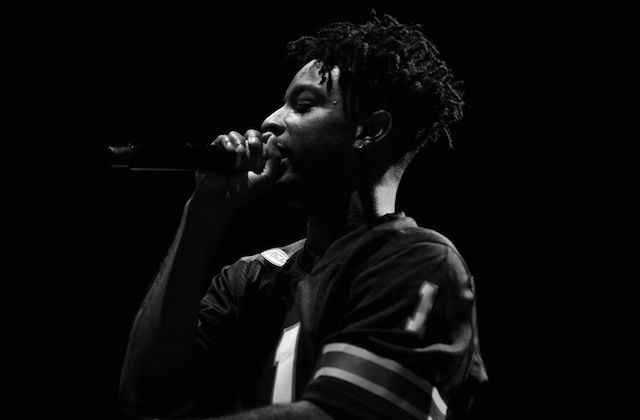Thoughts of 21 Savage and his simple acts of kindness in 2019 bring actual tears to my eyes. Maybe it’s because I spend so much of my time absorbing and then writing about terrifying, tragic news stories on immigration, which in turn makes me suspect that apathy will be the death of us all. Or maybe it’s because I have a severely limited range in musical taste (my sweet spot falls somewhere between inappropriate and hide ya kids) that requires me to set a low bar for how I expect my favorite performers to act in real life. I can’t be sure. But what I do know is that 21 Savage gives a fuck. And he won’t be scared into silence.
The internet was initially full of jokes and more jokes when news spread that U.S. Immigration and Enforcement (ICE) agents arrested the Grammy-nominated rapper and youth activist in Atlanta on Super Bowl Sunday. Folks mainly wanted to know how someone who named himself “21” after a gang in Decatur, Georgia, and constantly referenced his upbringing in East Atlanta’s Zone 6, could possibly be a British citizen.
Fans quickly sobered up, however, when the severity of the situation became clear. The Bank Account Campaign rapper born She’yaa Bin Abraham-Joseph in the United Kingdom was possibly facing deportation and a 10-year-ban on returning to the United States. According to NBC News, Abraham-Joseph’s legal representatives insisted their client’s detention was based on “incorrect information” about an alleged criminal charge, and that he had "no criminal convictions or charges under state or federal law."
Fans and activists rallied then behind the detained rapper. Black Lives Matter cofounder Patrisse Khan-Cullors created a petition to halt his deportation; Los Angeles Times reported on several civil rights organizations, including UndocuBlack, Color Of Change and Define American, that joined the effort to defend Abraham-Joseph. From the petition:
The hundreds of ICE assaults and detention of Black immigrants is an endemic in the United States and is too often carried out with the assistance of local law enforcement. The circumstances of Mr. Abraham-Joseph’s detention stand as a testament to the consistent and historically underreported harassment and targeting of Black immigrants. The U.S.’s violent history of criminalizing Blackness intersects with its deadly legacy of detaining and deporting Black and Brown immigrants. This needs to stop today.
The musician used the attention focused on his ordeal as an opportunity to highlight the plight of young people known as Dreamers—the 700,000+ immigrants who were brought to the United States as children. Obama-era program Deferred Action for Childhood Arrivals (DACA) provides deportation protection for this group. NPR published telling statements from 21’s lawyers shortly after his arrest:
"As a minor, his family overstayed their work visas, and he, like almost two million other children, was left without legal status through no fault of his own," Charles H. Kuck, a lawyer for Abraham-Joseph, said in a statement issued Monday.
In a separate statement issued Tuesday, Abraham-Joseph’s representatives explicitly compared his situation to the roughly 700,000 young people who are legally in the U.S. because of the Deferred Action for Childhood Arrivals program, or DACA. The Trump administration’s attempts to repeal DACA have been blocked repeatedly in court.
"These ‘Dreamers’ come from all walks of life and every ethnicity," the Tuesday statement says.
Savage was released on February 12, following 10 days of detention, a $100,000 bond and an expedited hearing, but his fight was just beginning. He openly referred to the immigration system in the United States as “broken” and called for change. The rapper repeatedly used his large platform to give voice to millions of young people being denied legal status. According to The Associated Press, Savage stressed that immigrants of undocumented status who arrived as children shouldn’t have to struggle to obtain visas and should automatically become citizens. “When you’re a child, you don’t know what’s going on,” he explained. “Now, you grow up and got to figure it out. Can’t get a job. Can’t get a license. I’m one of the lucky ones who became successful. It’s a lot of people who can’t.”
In October, the National Immigration Law Center gave 21 Savage the Courageous Luminaries Award for his immigration advocacy. According to the organization’s web site, the rapper was honored for “helping to shine a light on our country’s broken immigration system by speaking out against the way he was aggressively targeted and detained earlier this year by ICE for overstaying his visa.”
Savage is a damn good rapper—arguably among the best in the business. He can be dangerous, funny, sexy, vulnerable and respectful of his mama all in the same incredible album. His style is genuinely unique in a sea of copycats and wannabes. However, it’s his desire to speak for the voiceless and hold the door for others that truly sets him apart.
"My situation is important ’cause I represent poor Black Americans and I represent poor immigrant Americans," Savage told The New York Times. "You gotta think about all the millions of people that ain’t 21 Savage that’s in 21 Savage shoes," he added.
We’re deeply grateful for the reminder.
More of Shani’s Favorites:
TV Show: “Top Boy”
Movie: “The Black Godfather”
Music: “Homecoming: The Live Album,” by Beyonce
